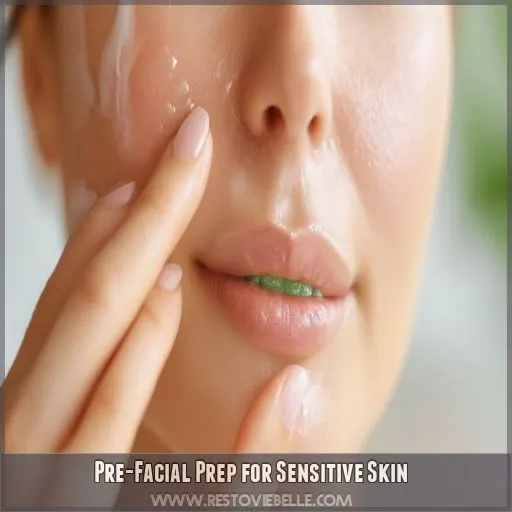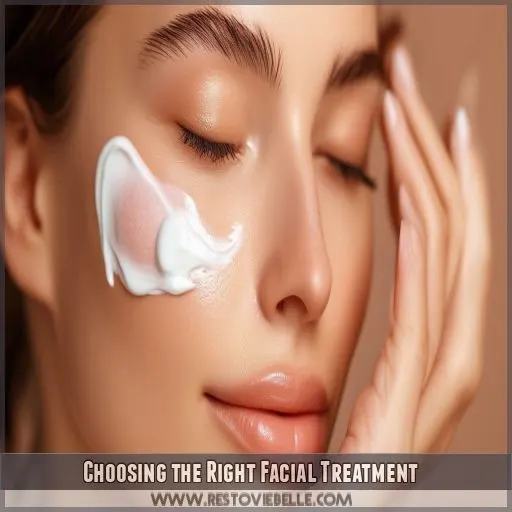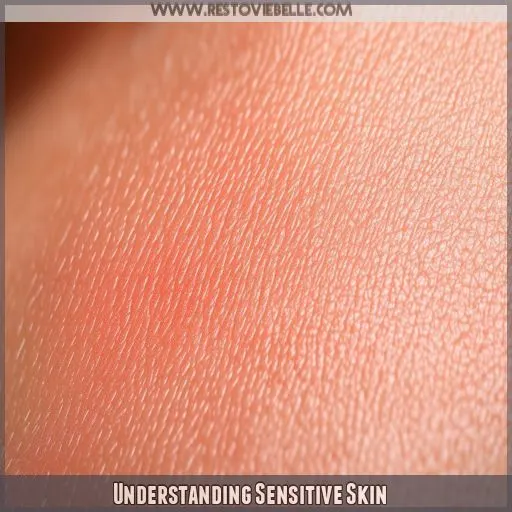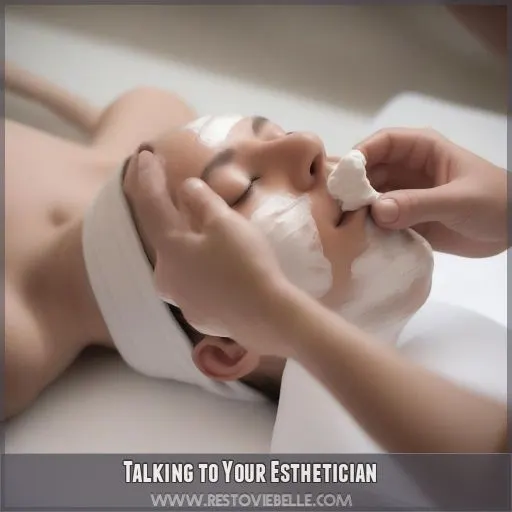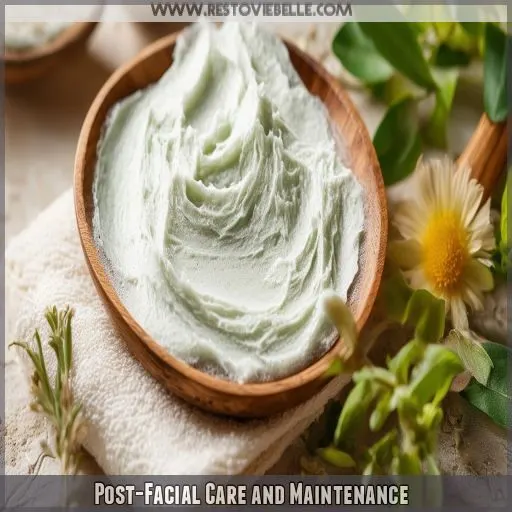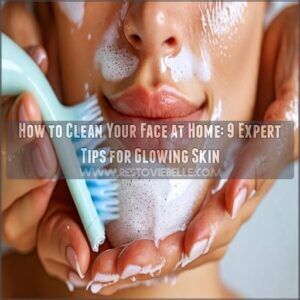This site is supported by our readers. We may earn a commission, at no cost to you, if you purchase through links.
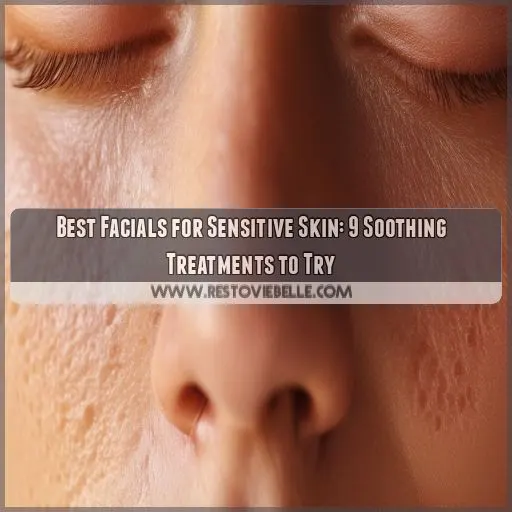 If you’re craving a facial but worried about your sensitive skin, you’ve got options. Sensitive skin can be soothed and purified with the right treatments. Say Yes to gentle procedures and soothing, natural ingredients. Think fruits, plants, and sea-derived extracts like seaweed.
If you’re craving a facial but worried about your sensitive skin, you’ve got options. Sensitive skin can be soothed and purified with the right treatments. Say Yes to gentle procedures and soothing, natural ingredients. Think fruits, plants, and sea-derived extracts like seaweed.
For a truly calming experience, look for facials designed to fight environmental factors that irritate sensitive skin. The Geneo Detox Facial is one such option, using green tea to battle allergens. You might also try a Pai Instant Calm facial, which is perfect for plumping and lifting. Or, opt for organic, wild-crafted, and synthetic-free products like those used in the Honua Hawaiian Facial.
If you want to learn more about facials for sensitive skin, read on.
Table Of Contents
- Key Takeaways
- Pre-Facial Prep for Sensitive Skin
- Choosing the Right Facial Treatment
- Understanding Sensitive Skin
- Getting a Professional Skin Analysis
- Talking to Your Esthetician
- Seeking Professional Advice
- Top 9 Facial Products for Sensitive Skin
- 1. Tinted SPF 45 Facial Sunscreen
- 2. La Roche Posay Micellar Cleansing Water Sensitive Skin
- 3. Tonymoly Wonder Ceramide Mochi Toner
- 4. First Aid Beauty Ultra Repair Cream
- 5. Vichy Aqualia Thermal Rich Face Cream
- 6. Cetaphil Moisturizing Cream Fragrance Free
- 7. CeraVe Skin Renewing Night Cream
- 8. Aveeno Triple Oat Hydrating Face Serum
- 9. Avène Tolerance Control Soothing Cream
- Post-Facial Care and Maintenance
- Frequently Asked Questions (FAQs)
- Which skincare products are best for sensitive skin?
- Where to go for a good facial for sensitive skin?
- Which facial cleanser is best for sensitive skin?
- How do I choose the best face moisturizers for sensitive skin?
- Which type of facial is best for sensitive skin?
- Is HydraFacial good for very sensitive skin?
- What is the best thing for sensitive skin on face?
- What is the best skin routine for sensitive skin?
- What should I do if I experience an allergic reaction?
- How often should I get a facial?
- Are there any at-home alternatives to professional facials?
- What should I do if my skin becomes irritated after the facial?
- How long do the effects of the facial last?
- Conclusion
Key Takeaways
- Sensitive skin doesn’t have to miss out on the spa day glow-up. With the right prep, products, and treatments, you can enjoy facials too.
- It’s important to consult a dermatologist and do your research before booking a facial. Find a trusted facialist who understands your skin type and concerns, and be open about your skin journey.
- Natural anti-inflammatories like oat extract and chamomile, and hydrating ingredients like hyaluronic acid, are your BFFs. Avoid harsh chemicals and exfoliating acids.
- There’s a range of gentle facial treatments available, from hydrating European facials to the trendy sculpting facial. Space out your treatments and opt for soothing options to keep your sensitive skin happy.
Pre-Facial Prep for Sensitive Skin
When you have sensitive skin, prepping for a facial goes beyond the usual skincare routine. It’s like preparing for a marathon, not a sprint – and it’s really important to get it right.
Consult Your Dermatologist
Before booking your first facial, schedule a consultation with your dermatologist. They can point you in the right direction for facial treatment providers who specialize in sensitive skin. During this visit, discuss your skin concerns and allergies. Some dermatologists even offer facial treatments in their offices, so it’s worth asking about this option. If not, they can recommend trusted estheticians in your area.
Your dermatologist will also advise you on skincare products to use (and avoid) to make sure your routine matches your facial treatments.
Research Facial Treatments
When researching facial treatments, inquire about the products used, checking for potential allergens or irritating ingredients. Avoid strong exfoliating acids. Research the provider’s reputation and experience, and consider the ambiance and hygiene standards of the facility. You want to make sure you have a soothing, gentle experience for your sensitive skin.
Communication is Key
If you’re hoping for a skin glow-up, especially if you have sensitive skin, clear communication is key. Here are some tips to keep in mind when talking to your facialist:
- Be upfront about your skin concerns and allergies. Don’t hold back on sharing any issues like acne, hyperpigmentation, or skin reactivity.
- Discuss your skincare goals and expectations. Are you aiming for a deep cleanse, hydration boost, or something else? Let your facialist know so they can tailor the treatment.
- Request hypoallergenic products. It’s better to be safe than sorry, so ask for products that are less likely to trigger a reaction.
- Provide details about your current skincare routine and any prescription medications you’re using. This helps your facialist understand your skin’s needs and avoid potential clashes with the treatment.
Choosing the Right Facial Treatment
Now that you’ve prepped your skin and consulted the experts, it’s time to explore facial treatments. With so many options available, from hydrating European facials to the trendy sculpting facial, picking the right treatment can feel overwhelming.
Avoid Harsh Treatments
When choosing a facial treatment, it’s important to steer clear of harsh options that could irritate your sensitive skin. Opt for hydrating and soothing treatments that focus on calming your skin, rather than those that emphasise exfoliation or anti-aging.
Avoid extractions and harsh exfoliating treatments, which can irritate your skin and lead to hyperpigmentation. Instead, seek out gentler alternatives, such as peels, and treatments containing soothing ingredients.
Gentle Options for Sensitive Skin
When choosing a facial treatment, it’s important to opt for gentle options that will soothe your sensitive skin. Here are some key considerations:
- Hydrating and Soothing Treatments: Choose treatments focused on hydration and calming sensitive skin. Avoid harsh exfoliating treatments and extractions, which can irritate your skin.
- Ingredients to Look For: Seek treatments containing hyaluronic acid, mandelic acid, or red/blue LED light. These ingredients are known to be gentle and effective for sensitive skin.
- Gentle Alternatives: If you’re concerned about extractions and exfoliation, consider gentler alternatives like peels, which can provide similar benefits without irritating your skin.
- Avoid Strong Exfoliating Acids: Stay away from treatments that use strong exfoliating acids, as these can be too harsh for sensitive skin.
- Ambience and Hygiene: Don’t underestimate the importance of the treatment facility’s ambiance and hygiene standards. A clean, relaxing environment can enhance your overall experience and skin health.
European Facial
If you’re looking for a gentle, traditional facial, the European facial is a great option. This minimalistic approach to skincare includes cleansing, exfoliation, extractions, a moisturizing mask, and sometimes a massage.
| Treatment Type | Description | Sensitive Skin Suitability |
|---|---|---|
| Cleansing | Removes dirt and impurities | Suitable, especially with gentle cleansers |
| Exfoliation | Sloughs off dead skin cells | Gentle exfoliation is key; avoid harsh scrubs |
| Extractions | Removal of blackheads and whiteheads | Can be irritating; make sure your esthetician uses proper techniques |
| Moisturizing Mask | Hydrates and soothes skin | Beneficial for sensitive skin |
| Massage | Relaxing facial massage | May be soothing, but make sure pressure is comfortable |
The European facial can be adapted to your skin’s needs, but always make sure that exfoliation and extractions are performed gently to avoid irritation. If you have inflammatory conditions like rosacea or severe acne, it’s best to consult a dermatologist first.
HydraFacial
If you’re looking for a gentle, yet effective facial treatment for your sensitive skin, the HydraFacial might be your new BFF. Here’s the lowdown on this popular skincare treatment:
- Impurity-Busting: The HydraFacial uses Vortex technology, a fancy way of saying it sucks up all the gunk (aka impurities) from your pores while giving your skin a good dose of hyaluronic acid, peptides, and antioxidants.
- Multi-Tasking: This facial is a triple threat, exfoliating, extracting, and hydrating your skin all in one go.
- Quick Fix: Most treatments take just 30 minutes, so you can squeeze in a session during your lunch break and still have time to grab a bite.
- Not-So-Calm Complexions: While the HydraFacial is suitable for sensitive skin, it does involve exfoliating acids and extraction, which might be a tad too stimulating for super-sensitive skin.
- Costly Commitment: The cost of a HydraFacial can vary, but it’s generally more expensive than your average spa treatment. Think of it as an investment in your skin’s happiness.
The HydraFacial is a great option for those with oily, acne-prone skin, but if your skin is extra-sensitive, you might want to opt for something even gentler, like a soothing oatmeal mask or a chamomile-infused treatment.
Sculpting Facial
If you’re after a natural, non-invasive lift, a sculpting facial might be your jam. This treatment incorporates gua sha techniques, which use a stone tool to contour your face and release muscle tension. The cool temperatures of the gua sha stones can also soothe inflammation.
The lymphatic drainage massage from the gua sha tool can reduce facial puffiness for up to 24 hours. Talk about instant results!
Acupuncture Facial
Piercing the skin with needles may sound scary, but it’s actually a gentle way to stimulate collagen production and blood flow.
This treatment can be a great option for addressing fine lines and wrinkles, and it may also help decrease stress, which can worsen skin conditions.
While there isn’t much data on the effectiveness of acupuncture facials specifically, similar treatments like fractionated lasers and microneedling have proven collagen-boosting benefits.
Microdermabrasion and Microcurrent Facial
If you’re feeling adventurous and want to try microdermabrasion and microcurrent facials, here’s what you need to know:
The Triple Crown Facial is a dynamic duo of treatments that combines microdermabrasion and microcurrent technology. Here are the key steps and benefits:
- Microdermabrasion: A diamond-tipped wand gently exfoliates your skin, sloughing off dead skin cells and revealing a smoother, brighter complexion.
- Microcurrent Technology: This innovative step involves sending a low-voltage current across your skin to reduce puffiness, tone muscles, tighten the skin, and enhance your facial contours. It’s like a workout for your face, but without the sweat!
- Results: After microdermabrasion, your skin might feel temporarily tight and dry, and you may experience some redness that should subside within 24 hours. Microcurrent technology is often recommended for "prejuvenation" and maintenance, as the results are typically subtle.
- Sensitive Skin Concerns: While microdermabrasion and microcurrent facials are generally considered safe for most skin types, always discuss any sensitivities or concerns with your dermatologist or esthetician beforehand.
Understanding Sensitive Skin
Before diving into the best facials for sensitive skin, it’s important to understand what sensitive skin is.
It can be linked to genetics or another health condition, and symptoms can include hives, swelling, burning, or stinging.
Distinguishing between sensitive and reactive skin is key; the latter reacts to specific ingredients or products, often with redness or irritation.
Sensitive Skin: Definition and Causes
Sensitive skin is a common issue, often linked to genetics. It can also be a symptom of another health condition. For those with sensitive skin, certain ingredients or products can trigger reactions like hives, swelling, burning, or stinging.
While the exact causes of sensitive skin can vary, it’s often a combination of genetics, environmental factors, and lifestyle choices.
Reactive Skin: Definition and Causes
Reactive skin is a type of skin sensitivity where your skin reacts to certain ingredients or products, resulting in redness or irritation. This reaction can be a real buzzkill, leaving you with a not-so-glowing complexion. Here are some common triggers:
- Allergic reactions: Some people’s skin flares up when exposed to specific allergens, such as pollen, pet dander, or certain foods.
- Product triggers: Using the wrong skincare products can irritate reactive skin. Fragrances, harsh chemicals, and certain preservatives are common culprits.
- Environmental factors: Sun exposure, wind, and pollution can all take a toll on reactive skin, causing it to become inflamed and sensitive.
- Stress and lifestyle: Believe it or not, stress can show up on your skin. When you’re feeling frazzled, your skin may react by breaking out or becoming more sensitive.
- Skin conditions: Underlying skin conditions like atopic dermatitis (eczema) or rosacea can contribute to reactive skin.
A Dermatologist Can Help
If you’re unsure whether your skin is sensitive or reactive, a dermatologist can help. They can determine the root cause of your skin issues and recommend suitable products.
| Skin Concern | Dermatologist’s Role | Outcome |
|---|---|---|
| Redness or Irritation | Reviewing product usage | Identify triggers |
| Severe Irritation | Providing advice | Recommending gentle products |
| Persistent Redness | Addressing underlying causes | Offering treatments |
Getting a Professional Skin Analysis
A professional skin analysis is a great way to get a deeper understanding of your skin and its unique needs. This involves a thorough examination of your skin, including mapping techniques and three-dimensional analyses, to determine your skin type and address any concerns or discomfort.
Mapping Techniques
Skin mapping is like a detective’s magnifying glass, giving you a clear picture of your skin’s unique story. Here’s what you need to know:
- Skin Mapping: Think of it as a GPS for your face, pinpointing areas of concern like dry patches or breakouts. This helps determine your skin type and any potential issues.
- Focus Areas: Skin mapping considers factors like skin tone and hydration levels, making sure your treatment plan is right for you.
- Ingredient Know-How: Understanding your skin’s needs helps choose the right ingredients. For example, hyaluronic acid for hydration or chamomile for its calming properties.
- Benefits: A professional skin analysis makes sure you’re not guessing with your skincare. It’s like having a personal skin GPS, guiding you toward products and treatments that are a perfect match.
Three-Dimensional Analyses
During a three-dimensional analysis, your esthetician will go beyond the surface level. They’ll inspect your pores, assess sun damage, and evaluate visible signs of aging. This detailed examination provides a deeper understanding of your skin’s condition and unique needs.
Benefits of Analysis
Want to have skin that glows? You need the right info. A professional skin analysis gives you a peek inside your skin’s unique needs. Here’s why it’s worth it:
- Gaining Insights: Skin care pros use mapping and 3D tools to check out your skin tone, how hydrated it is, pores, sun damage, and signs of aging. This helps figure out what’s causing any issues and where to focus.
- Making Informed Choices: With a skin analysis, you can pick the right beauty products and treatments for you. Knowing your skin type and needs means you’re investing in the best options for your routine.
- Identifying Irritants: One of the best things about a skin analysis is finding out what’s irritating your skin. Knowing what triggers sensitive skin helps you avoid ingredients and products that cause redness, irritation, or other problems.
- Customizing Your Routine: A skin analysis gives you a personalized plan for your skincare journey. With this info, you can tailor your daily routine, from choosing the right cleanser and moisturizer to adding targeted treatments that address your specific concerns.
Talking to Your Esthetician
When booking a facial, it’s really important to chat with your esthetician about your sensitive skin. Ask the right questions to make sure they know your skin type and can create a treatment that’s perfect for you.
Ask About Experience
When booking a facial treatment, don’t hesitate to ask your esthetician about their experience treating sensitive skin.
It’s really important to find someone who understands your skin type and can tailor the treatment to your needs.
You wouldn’t want a one-size-fits-all approach for your skin!
Choose a facialist who’s got a proven track record of success with sensitive skin clients.
This means they’ve got the knowledge and skills to provide a safe and effective treatment, leaving your skin feeling soothed and pampered.
Discuss Suitable Ingredients
When discussing suitable ingredients with your esthetician, be sure to ask about their product choices and whether they’re made for sensitive skin. Here are some key ingredients to look out for:
- Oat Extract: A natural anti-inflammatory, it soothes irritated skin and reduces redness.
- Chamomile: With its calming properties, chamomile is ideal for treating sensitive skin, especially when acne is a concern.
- Hyaluronic Acid: This ingredient is a moisture magnet, helping to lock in hydration and keep skin supple.
- Argan and Squalane Oils: These oils provide a comforting and softening effect, creating a protective barrier for sensitive skin.
Clarify Expectations
When chatting with your esthetician, it’s important to clarify your expectations. Ask questions like: "What will the facial involve?" "Will there be any discomfort?" "How will my skin feel afterward, and what results can I expect?"
Making sure you’re both on the same page helps avoid surprises. It’s also a chance to address any worries and tailor the treatment to your needs. For example, if you’re concerned about skin dryness, flaking, or itching, share this so they can adjust the products and techniques used.
Post-Facial Care
After your facial, it’s important to care for your skin to maintain that post-facial glow and avoid irritation.
Ask your esthetician about recommended products for post-facial care, especially if you have sensitive skin.
They might suggest soothing creams or serums to enhance your skin’s recovery.
Remember to limit additional treatments for at least 24 hours post-facial to give your skin a break and prevent irritation.
Seeking Professional Advice
When your skin is acting up and over-the-counter products aren’t cutting it, it’s time to consult a dermatologist. These skin Experts can help identify the root causes of your sensitivity and address any concerns you have about redness or irritation.
Consult a Dermatologist
If you’re dealing with sensitive skin, it’s a good idea to consult a dermatologist. They can help you in several ways:
- Get a referral: Dermatologists can recommend facial treatment providers who specialize in sensitive skin. This makes sure you’re in capable hands.
- Discuss your skin concerns: Be open about your skin allergies and issues. This helps the dermatologist understand your unique needs.
- Explore in-office treatments: Some dermatologists offer facial treatments in their offices. This can be a convenient option, especially if you’re already comfortable with the doctor.
- Get product recommendations: Dermatologists can suggest skincare products suitable for sensitive skin and advise on ingredients to avoid. This takes the guesswork out of choosing products.
Identify Root Causes
When dealing with sensitive skin, it’s really important to figure out what’s making your skin react. A dermatologist can help you do just that by looking at the products you use and your daily habits. They can pinpoint the specific ingredients or lifestyle things that might be causing your skin to get sensitive. This knowledge will help you make smart choices about your skincare routine and facial treatments.
| Potential Root Causes | Solutions |
|---|---|
| Ingredients | Identify and avoid triggers. |
| Lifestyle Factors | Make adjustments for skin health. |
| Environmental Triggers | Minimize exposure to irritants. |
Top 9 Facial Products for Sensitive Skin
So, you’ve done your research, prepped your skin, and consulted the experts. Now, it’s time to check out the top nine facial products that’ll have your sensitive skin feeling soothed and pampered. From cleansing waters to calming creams, these carefully curated picks are here to save your skin’s day.
1. Tinted SPF 45 Facial Sunscreen
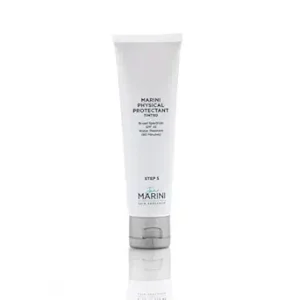
If you’re looking for a sunscreen that plays well with your sensitive skin, this product might be your new BFF. Tinted SPF 45 Facial Sunscreen is a lightweight, oil-free formula that plays double duty by protecting your skin from the sun and providing a sheer, matte finish.
The broad-spectrum UVA and UVB protection shields your skin from harmful rays, while the oil control feature keeps shine at bay. This formula is noncomedogenic, so it won’t clog your pores. Plus, it’s water-resistant for up to 80 minutes, making it a great choice for a day by the pool or at the beach.
Dermatologists and aestheticians give this product their stamp of approval, and it’s even recommended for those with eczema and rosacea. The universal tint is subtle, adding a hint of colour without feeling like makeup. It also layers beautifully under foundation, creating a smooth canvas.
While the packaging may leave something to be desired (some users have experienced leaking), the "tacky" layer it leaves behind actually helps your foundation stay put. So, if you’re seeking a sunscreen to keep your sensitive skin happy and prepped for makeup, this one’s a winner.
Best For: Sensitive skin, those looking for a lightweight, oil-free sunscreen with a sheer matte finish, and individuals seeking a product that layers well under makeup.
- Lightweight, oil-free formula
- Broad-spectrum UVA and UVB protection
- Noncomedogenic and water-resistant
- Some users report packaging issues and formula inconsistency
- May leave a "tacky" layer that some find undesirable
- Can be expensive
2. La Roche Posay Micellar Cleansing Water Sensitive Skin
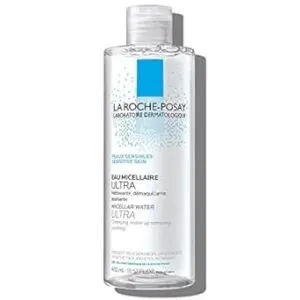
La Roche Posay Micellar Cleansing Water is a sensitive skin savior. This no-rinse cleanser uses micelles to attract and lift away dirt, oil, and makeup, leaving your skin feeling refreshed and clean. It’s a gentle yet effective makeup remover that won’t irritate your skin. With its water-like texture and mild scent, it’s a soothing way to cleanse and tone your skin.
While it’s a hit for its gentleness and effectiveness, some users found it less moisturizing than expected. A few also experienced issues with the packaging, noting that the caps can sometimes break.
Best For: Those with sensitive skin who want a gentle yet effective makeup remover.
- Removes makeup and impurities without irritation.
- Gentle enough for everyday use.
- Easy to use, no rinsing required.
- May not be as moisturizing as other cleansers.
- Some users have experienced packaging issues.
- May not be suitable for all skin types.
3. Tonymoly Wonder Ceramide Mochi Toner
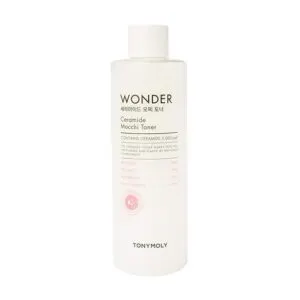
The Tonymoly Wonder Ceramide Mochi Toner is a great option for sensitive skin. This hypoallergenic, alcohol- and irritant-free toner is formulated with EWG Green-rated ingredients, so you can trust that it’s gentle and safe. It contains ceramides, vitamin B, and hyaluronic acid, which work together to hydrate and strengthen your skin barrier. The result? Smooth, supple, dewy skin that’s ready for the rest of your skincare routine or a light beat.
Many customers have seen positive results within days of using this toner, and it’s a particularly good choice if you’re looking for an affordable alternative to witch hazel-based toners.
Best For: This toner is best for those with sensitive skin who are looking for a gentle and hydrating toner.
- Hypoallergenic, alcohol-free, and irritant-free making it safe for sensitive skin.
- Formulated with EWG Green-rated ingredients ensuring the use of gentle and safe ingredients.
- Provides hydration and strengthens the skin barrier, leaving skin feeling smooth, supple, and dewy.
- May not be enough for extremely dry skin on its own, requiring additional moisturizers.
- Some users prefer other milky toners, indicating a matter of personal preference.
- May not be suitable for everyone, as some individuals may experience mild irritation or reactions.
4. First Aid Beauty Ultra Repair Cream
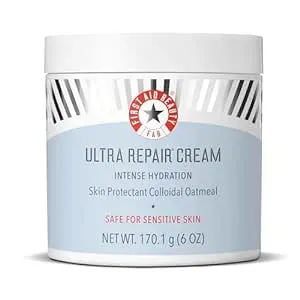
If you’re after a thick, whipped cream that absorbs quickly, First Aid Beauty Ultra Repair Cream is your go-to.
It’s designed for all skin types, but especially sensitive skin, and it’s clinically proven to boost hydration by 169% with just one use.
The cream contains colloidal oatmeal, which:
- soothes dry, irritated skin and eczema
- strengthens the skin’s barrier
- promotes skin renewal
It’s also free from common irritants like:
- alcohol
- artificial colors
- fragrances
However, it doesn’t contain SPF, so you’ll need to use additional sun protection.
Some users have noted that the jar doesn’t always seem full.
Best For: Those with sensitive skin looking for a thick, hydrating cream that absorbs quickly.
- Clinically proven to boost hydration
- Contains soothing colloidal oatmeal
- Free from common irritants
- Doesn’t contain SPF
- Some users report jars not being full
- May be too thick for some skin types
5. Vichy Aqualia Thermal Rich Face Cream
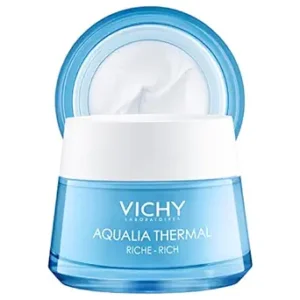
This French-made face cream is a hydration hero, packing a powerful punch with hyaluronic acid, plant sugar, and Vichy’s volcanic water. The result? Up to 48 hours of hydration for your skin. But that’s not all—it also helps smooth out fine lines and gives your skin tone an even, natural glow.
The cream has a thick consistency but glides on smoothly, leaving your skin feeling supple and soft. And with 97% natural origin ingredients, you can trust that what you’re putting on your sensitive skin is gentle and effective.
User reviews speak for themselves: 9 out of 10 women noticed their skin feeling softer and more hydrated, while 8 out of 10 raved about a fresher, more luminous complexion. So, if you’re looking for a face cream that delivers on its promises, this one’s a keeper.
Best For: This face cream is best for those seeking intense hydration, a smoother complexion, and a natural glow.
- Up to 48 hours of hydration
- Helps smooth fine lines and evens skin tone
- 97% natural origin ingredients
- Some found the scent to be slightly musty
- Jar may not be completely full
- May not play well with other products like serums or primers
6. Cetaphil Moisturizing Cream Fragrance Free
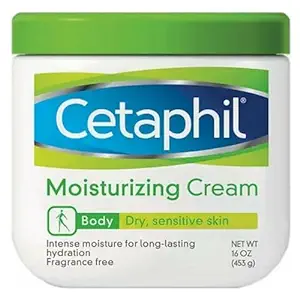
Cetaphil Moisturizing Cream Fragrance Free is a trusted product for sensitive skin. It provides intense and long-lasting moisture, making it ideal for eczema-prone and very dry skin. Clinically proven to deliver immediate and lasting hydration, it also soothes itchy skin. Its unique formula attracts water to the skin and helps prevent moisture loss. The cream is fragrance-free, non-comedogenic, and quickly absorbs into the skin, leaving it soft and smooth. However, it may be too heavy for some skin types, so it’s recommended to test it on a small area first.
Best For: People with sensitive, dry, or eczema-prone skin who need long-lasting hydration.
- Provides intense and long-lasting moisture.
- Soothes itchy skin.
- Quickly absorbs into the skin, leaving it soft and smooth.
- May be too heavy for some skin types.
- May take about 20 minutes to absorb into the skin.
- Does not soothe or heal already cracked and bleeding skin.
7. CeraVe Skin Renewing Night Cream
View On Amazon
CeraVe Skin Renewing Night Cream is a dermatologist-developed formula that works to renew tired-looking skin while you sleep.
The cream is packed with skin-loving ingredients like biomimetic peptides, ceramides, hyaluronic acid, and niacinamide.
These ingredients work together to:
- reduce the appearance of fine lines and wrinkles
- boost skin elasticity
- provide intense hydration
It’s also non-comedogenic, so it won’t clog your pores.
The only downside is that some users find the texture a bit thick and sticky, but it’s still a solid choice for sensitive skin.
Best For: Those looking for a hydrating night cream to reduce the appearance of fine lines and wrinkles, especially with sensitive skin.
- Packed with skin-loving ingredients like biomimetic peptides, ceramides, hyaluronic acid, and niacinamide.
- Non-comedogenic, so it won’t clog your pores.
- Developed with dermatologists.
- Some users find the texture a bit thick and sticky.
- Packaging may be damaged.
- May not be suitable for all skin types.
8. Aveeno Triple Oat Hydrating Face Serum
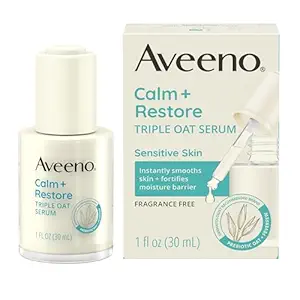
If you’re seeking a drugstore option, Aveeno’s Triple Oat Hydrating Face Serum is a solid choice. It’s formulated with a Triple Oat Complex and calming feverfew to soothe irritated, dry skin. This serum is designed to strengthen your skin’s natural moisture barrier, providing instant hydration and leaving your complexion smooth and soft. The formula is hypoallergenic, fragrance-free, and gentle enough for sensitive skin. Plus, it’s a steal at $20 for a 1-ounce bottle.
Best For: Sensitive skin types seeking a hydrating and soothing serum.
- Triple Oat Complex and feverfew calm and hydrate dry, irritated skin.
- Hypoallergenic, fragrance-free, and gentle enough for sensitive skin.
- Lightweight and fast-absorbing, leaving skin feeling soft and supple.
- Some users reported issues with the dropper, finding it difficult to use and prone to spilling.
- Price may be considered high for a 1-ounce bottle.
- While many users report positive results, some have experienced minimal or no noticeable difference in fine lines or skin texture.
9. Avène Tolerance Control Soothing Cream
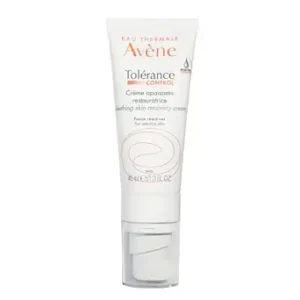
If you’re dealing with sensitive skin, Avène’s Tolerance Control Soothing Cream could be your new BFF. This cream promises to calm skin and soothe discomfort in just 30 seconds. It’s like having your very own skin savior in a tube.
The formula is 100% sterile and tested on allergic skin, so you can trust it to be gentle. It also helps restore your skin’s barrier in 48 hours, which is pretty impressive. Think of it as a knight in shining armor, ready to rescue your skin from irritation.
Now, keep in mind that some users found it a tad too heavy for oily skin, while others thought it wasn’t moisturizing enough for dry skin during winter. So, it might take some trial and error to find that "just right" balance. But hey, with sensitive skin, it’s all about finding what works for you.
Best For: People with sensitive skin who need immediate relief from irritation and discomfort.
- Soothes and calms skin in 30 seconds.
- Helps restore skin barrier in 48 hours.
- 100% sterile formula tested on allergic skin.
- May be too heavy for oily skin.
- May not be moisturizing enough for dry skin in winter.
- Price may vary.
Post-Facial Care and Maintenance
So you’ve had your facial and your skin is feeling oh-so-fine. Now what? Taking care of your skin after a facial is key to keeping that healthy glow and keeping your sensitive skin happy. Let’s talk about the dos and don’ts of post-facial skincare so you can get the most out of your treatment and keep that radiant complexion going.
Limit Additional Treatments
It’s best to keep things simple and give your skin some breathing space after a facial. Here are a few tips to keep in mind:
- Avoid additional treatments on the same day as your facial.
- Space out treatments by at least 24 hours to give your skin a break and minimize any potential irritation.
- Focus on gentle, soothing skincare for the next few days.
- Avoid harsh exfoliants or extractions, and opt for calming ingredients like hyaluronic acid or chamomile.
Take Photos a Few Days After the Facial
Give your skin some time to heal and breathe after your facial. Taking photos a few days later will let you see the true results and any skin reactions.
| Treatment Type | Time for Results | Healing Time |
|---|---|---|
| Hydrating Facial | 3-5 days | 2-3 days |
| Sculpting Facial | 1-2 weeks | 3-5 days |
| Acupuncture Facial | 4-6 weeks | 1-2 weeks |
Building a Relationship With a Trusted Facialist
Finding a facialist you trust is like finding a hairstylist who gets your vision—it’s a match made in heaven. Here’s how to build that relationship:
- Find your facial soulmate: Seek a facialist who understands your skin type and concerns.
- Communicate: Share your skin’s journey, including any concerns or changes. A good facialist will listen and adjust treatments accordingly.
- Consistency is key: Regular treatments with the same facialist allow them to deeply understand your skin and its unique needs.
- Feedback loop: Provide feedback after each treatment. This helps your facialist fine-tune their techniques and products to suit your skin’s sensitivity.
Frequently Asked Questions (FAQs)
Which skincare products are best for sensitive skin?
The skincare aisle can feel like a minefield when you have sensitive skin. The wrong product can leave your complexion crying out for help. But fret not, there’s a way to calm the chaos.
Seek solace in the soothing embrace of natural anti-inflammatories like oat extract and chamomile. Hyaluronic acid locks in moisture, while argan, squalane, meadowfoam, and jojoba oils provide a comforting caress. Calendula, nature’s nurturer, restores tranquility to troubled skin.
Where to go for a good facial for sensitive skin?
When looking for a good facial for sensitive skin, it’s important to do your research. Consult a dermatologist to understand your skin’s unique needs and get recommendations for reputable providers. Be sure to inquire about the provider’s experience and the specific ingredients used in their treatments to make sure they’re right for your sensitive skin.
Which facial cleanser is best for sensitive skin?
You don’t want to be a red-faced mess, so steer clear of harsh, skin-stripping cleansers. Opt for gentle, creamy formulas with soothing ingredients like oat extract, chamomile, hyaluronic acid, and calming oils.
How do I choose the best face moisturizers for sensitive skin?
When choosing a moisturizer, look for calming, anti-inflammatory ingredients like oat extract, chamomile, and hyaluronic acid. Avoid harsh chemicals and exfoliating acids. Always do a patch test first.
Which type of facial is best for sensitive skin?
If you’re looking for a facial that’ll pamper your sensitive skin, opt for a gentle, hydrating treatment. Steer clear of harsh exfoliation or extractions, and instead, go for soothing options like hyaluronic acid or LED light therapy. Space out treatments to give your skin a breather.
Is HydraFacial good for very sensitive skin?
Yes, HydraFacials are a good option for very sensitive skin. They’re non-invasive, soothing, and moisturising. They can be adjusted to your skin concerns and won’t cause redness or irritation.
What is the best thing for sensitive skin on face?
I know, I know, you want a quick fix for your sensitive skin. But hold up! Before you slap on any old cream, let’s talk about finding the right facial treatment. It’s a game-changer for calming that temperamental complexion of yours.
What is the best skin routine for sensitive skin?
First, consult a dermatologist to understand your skin type and any allergies. Be open about your skin concerns and current skincare routine. Choose gentle, hydrating treatments and products with soothing ingredients like hyaluronic acid and chamomile.
What should I do if I experience an allergic reaction?
If you experience an allergic reaction, stop using the product you suspect. Take an antihistamine and apply an anti-inflammatory cream with hydrocortisone and aloe vera. If symptoms are severe, seek immediate medical care.
How often should I get a facial?
Experts recommend getting a facial every four to six weeks. This is because skin cells regenerate every four weeks. For specific skin concerns, like acne, you might want to get facials more frequently, like every two to three weeks.
Are there any at-home alternatives to professional facials?
Sure, you can get close to that spa experience at home. But be careful – you’re no pro, and some treatments are best left to the experts. Try creating a relaxing atmosphere and use gentle, suitable products.
What should I do if my skin becomes irritated after the facial?
If your skin becomes irritated post-facial, it’s best to consult a dermatologist to identify the root cause. They can advise on suitable products and treatments to calm and soothe your sensitive skin.
How long do the effects of the facial last?
It depends on the treatment you’ve had. For example, the effects of a sculpting facial can last up to 24 hours, while other treatments may have longer-lasting results.
Conclusion
You’re clued up on pre-facial prep, choosing the right treatment, understanding your skin, and seeking professional advice.
You’ve also discovered the best products to pamper your delicate complexion.
So, go forth and glow, knowing you’ve got the tools to navigate the facial scene with confidence and calm.
No more missing out on that spa-day glow-up!

